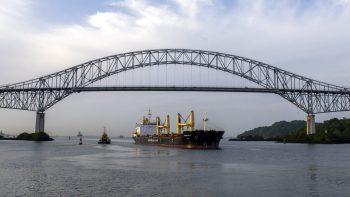Congress takes up free trade bills
Steve Chiotakis: There’s a hearing today at the House Ways and Means Committee, looking at free trade agreements with South Korea, Colombia and Panama. Congress is expected to vote on them within the next couple of weeks. So we wondered, how exactly does a deal with — say, Panama — actually create American jobs?
From Washington, Marketplace’s Nancy Marshall Genzer reports.
Nancy Marshall Genzer: The agreement will make it easier for Panama to send fruit and textiles to the U.S. We’ll sell Panama more heavy machinery to expand the Panama Canal.
Economist Jeff Schott is with the Peterson Institute for International Economics.
Jeff Schott: Many major U.S. equipment manufacturers have the opportunity for tremendous new business if they can get in and compete on a level playing field.
The trade agreement phases out tariffs, making all U.S. goods cheaper in Panama. The International Trade Commission estimates that U.S. rice exports to Panama will more than double. This all sounds great, but how many U.S. jobs would this deal actually create?
Robert Pastor teaches international relations at American University. He says the U.S. exports so little to Panama that even tripling rice exports still wouldn’t mean much.
Robert Pastor: In 2010, we exported more than 40 times more to Mexico than to Panama.
And Pastor says Panama exports so little to us, it won’t cost many U.S. jobs.
So why bother with Panama? Meredith Broadbent is a trade policy analyst at the Center for Strategic and International Studies. She says we can’t ignore even small countries, because our competitors are cutting favorable agreements with them.
Meredith Broadbent: It’s resulting in a bit of a spaghetti bowl of overlapping free trade agreements. But it’s a system that we do need to be a part of rather than sitting back from and trying to sell to the 5 percent of consumers that live in the United States.
Broadbent says it’s a big world out there and we need to sell wherever we can.
In Washington, I’m Nancy Marshall Genzer for Marketplace.
There’s a lot happening in the world. Through it all, Marketplace is here for you.
You rely on Marketplace to break down the world’s events and tell you how it affects you in a fact-based, approachable way. We rely on your financial support to keep making that possible.
Your donation today powers the independent journalism that you rely on. For just $5/month, you can help sustain Marketplace so we can keep reporting on the things that matter to you.


















